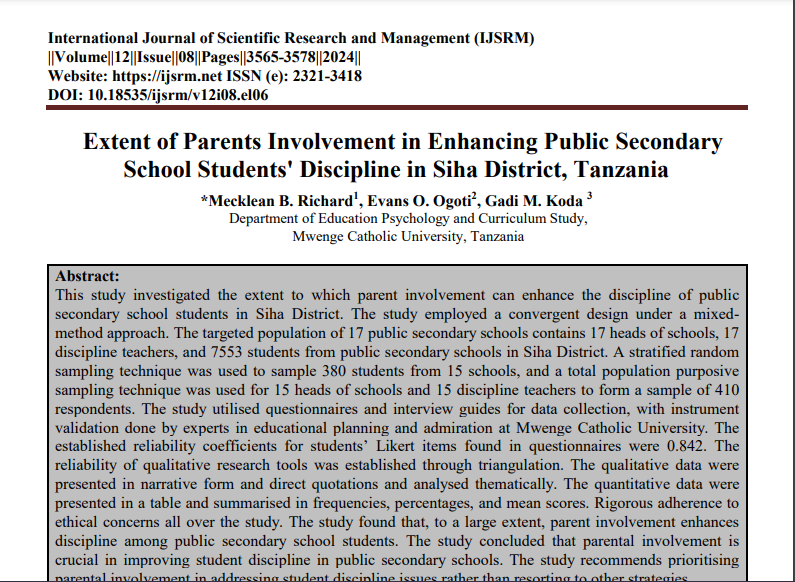Extent of Parents Involvement in Enhancing Public Secondary School Students' Discipline in Siha District, Tanzania

Submission to VIJ 2024-08-30
Keywords
- Parents involvement, student’s disciplines. School disciplines. Public secondary schools.
Copyright (c) 2024 Mecklean Richard, Prof.Evans Ogoti Okendo , Dr.Gadi M. Koda

This work is licensed under a Creative Commons Attribution 4.0 International License.
Abstract
Abstract:
This study investigated the extent to which parent involvement can enhance the discipline of public secondary school students in Siha District. The study employed a convergent design under a mixed-method approach. The targeted population of 17 public secondary schools contains 17 heads of schools, 17 discipline teachers, and 7553 students from public secondary schools in Siha District. A stratified random sampling technique was used to sample 380 students from 15 schools, and a total population purposive sampling technique was used for 15 heads of schools and 15 discipline teachers to form a sample of 410 respondents. The study utilised questionnaires and interview guides for data collection, with instrument validation done by experts in educational planning and admiration at Mwenge Catholic University. The established reliability coefficients for students Likert items found in questionnaires were 0.842. The reliability of qualitative research tools was established through triangulation. The qualitative data were presented in narrative form and direct quotations and analysed thematically. The quantitative data were presented in a table and summarised in frequencies, percentages, and mean scores. Rigorous adherence to ethical concerns all over the study. The study found that, to a large extent, parent involvement enhances discipline among public secondary school students. The study concluded that parental involvement is crucial in improving student discipline in public secondary schools. The study recommends prioritising parental involvement in addressing student discipline issues rather than resorting to other strategies.
References
- Aymelo, K. (2022). Student’sIndiscipline in Secondary Schools: The case of the Eastern Part of Ethiopia. International Journal of Advances in Scientific Research and Engineering, 08(06), 78–88. https://doi.org/10.31695/IJASRE.2022.8.6.9
- Chen, M., & Mok, I. A. C. (2023). Perceived parental involvement influences students’ academic buoyancy and adaptability: The mediating roles of goal orientations. Frontiers in Psychology, 14, 1248602. https://doi.org/10.3389/fpsyg.2023.1248602
- Dwarika, V. M. (2020). Positive behavior supports in South Africa: Training teachers to implement a systemic strategy. Intervention in School and Clinic, 55(3), 192–196. https://doi.org/10.1177/1053451219842212
- Grolnick, W. S., & Pomerantz, E. M. (2022). Should parents be involved in their children’s schooling? Theory Into Practice, 61(3), 325–335. https://doi.org/10.1080/00405841.2022.2096382
- Hill, N. E. (2022). Parental involvement in education: Toward a more inclusive understanding of parents’ role construction. Educational Psychologist, 57(4), 309–314. https://doi.org/10.1080/00461520.2022.2129652
- Hutchinson, D., & Chyung, S. Y. (Yonnie). (2023). Students Evidence-based Survey Design: Adding “moderately” or “somewhat” to likert scale options agree and disagree to get Interval-likert data. Performance Improvement Journal, 62(1), 17–24. https://doi.org/10.56811/PFI-22-0012
- Kombo, K. D., & Tromp, L. (2021). Proposal and thesis writing; An Introduction.: Vol. Vol. 6. Journal of Co-operative and Business Studies.
- Majani, W. P. (2020). Student-Teachers’ Experiences and Strategies of Managing Disruptive Behaviours in Tanzania Secondary Schools. African Journal of Teacher Education, 9, 152–174. https://doi.org/10.21083/ajote.v9i0.5856
- Masath, F. B., Hermenau, K., Nkuba, M., & Hecker, T. (2020). Reducing violent discipline by teachers using Interaction Competencies with children for teachers (ICC-T): Study protocol for a matched cluster randomised controlled trial in Tanzanian public primary schools. Trials, 21(1), 4. https://doi.org/10.1186/s13063-019-3828-z
- Mushi, L., Mandila, M., & Mosha, H. (2022). Extent to which teachers adhere to corporal punishment regulation in curbing students’ misbehaviour in public secondary schools in Rombo district, Tanzania. British Journal of Education, 10(11), 68–83.
- Ndwandwe, N. D. (2023). Parental involvement and academic achievement: Voices of role-players in secondary schools in Mpumalanga, South Africa. Research in Social Sciences and Technology, 8(4), 237–256. https://doi.org/10.46303/ressat.2023.41
- Omary, Z., & Salum, M. (2021). Parental involvement in their children’s education in selected secondary schools in Tanzania. Nama International Journal of Education and Development, 1, 1–14.
- Owino, A. M. (2023). Influence of parental involvement as a discipline management strategy on the academic achievement of students in Siaya county. Journal of Strategic Management, 7(6), 27–42. https://doi.org/10.53819/81018102t2191
- Peter, A., & Onyango, D. (2021). The roles of parents in enhancing academic performance among public secondary schools at Nyamagana District, Tanzania. East African Journal of Education and Social Sciences, 2(Issue 1 (January to March 2021)), 60–67. https://doi.org/10.46606/eajess2021v02i01.0066
- Rosalia, S., & Ridha, M. (2021). Relationship of parent patterns with student learning disciplines. Journal of Health, Nursing and Society, 1(2), 33. https://doi.org/10.32698/jhns.0090189
- Taherdoost, H. (2019). What Is the Best Response Scale for Survey and Questionnaire Design; Review of Different Lengths of Rating Scale / Attitude Scale / Likert Scale. International Journal of Academic Research in Management, 8(1), 1–10.
- Taylor Bunce, L., Bennett, M., & Jones, S. E. (2022). The relation between discipline Identity and academic achievement within a marketised higher education context: A serial mediation model of approaches to learning and course complaints. Frontiers in Psychology, 13, 749436. https://doi.org/10.3389/fpsyg.2022.749436
- United Nations General Assembly. (1989). Convention on the Rights of the Child, Article 18. United Nations, Treaty Series, vol. 1577, p. 3. https://www.ohchr.org/en/instruments-mechanisms/instruments/convention-rights-child
- Zulfana, L., & Wahyuni, A. (2023). Online Learning: Discipline and Responsibilities for Grade 3 Students Analysis. Academia Open, 8(1). https://doi.org/10.21070/acopen.8.2023.4912